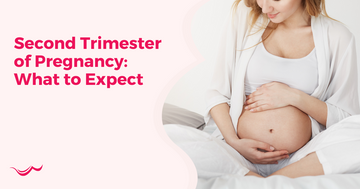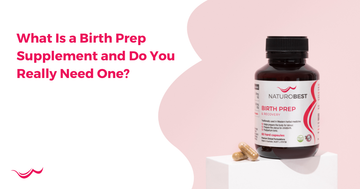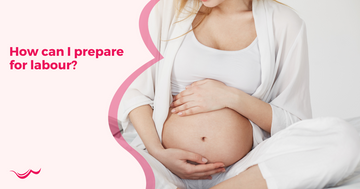Second Trimester of Pregnancy: What to Expect
by NaturoBest Naturopath Team on Apr 01, 2025

The second trimester of pregnancy is often referred to as the "honeymoon phase."
For many women, this is when the fatigue and nausea of the first trimester ease, making way for increased energy and a growing sense of connection with their baby.
However, it can come with its own set of challenges...
Many women experience pregnancy headaches in the second trimester, new physical changes, and the need for targeted nutrition. Understanding what to expect can help you feel more confident and prepared.
When Does the Second Trimester Start?
The second trimester begins at week 13 and continues until week 27. During this time, your baby develops rapidly, growing from the size of a lime to that of a cauliflower.
For many women, this is the most comfortable stage of pregnancy.
Morning sickness often subsides, energy levels return, and you might even start to feel those first exciting kicks. However, it’s also a time to stay vigilant about your health and ensure you’re providing the right support for both you and your baby.
Pregnancy Headaches in the Second Trimester: Causes and Relief
One common yet often unexpected symptom during this stage is pregnancy headaches. These can be triggered by a variety of factors:
-
Hormonal shifts – The surge in oestrogen and progesterone can contribute to headaches.
-
Increased blood volume – The body produces 50% more blood during pregnancy, which can lead to changes in circulation and headaches.
-
Dehydration – As your body works harder, it’s crucial to stay hydrated.
-
Low blood sugar – Skipping meals or not eating enough can trigger headaches.
-
Tension and posture changes – As your body adjusts to a growing belly, posture-related strain can lead to discomfort.
How to Manage Pregnancy Headaches Naturally
-
Stay Hydrated – Aim for at least 2.5 litres of water daily.
-
Eat Balanced Meals – Ensure steady blood sugar by eating nutrient-dense meals rich in protein and healthy fats. Don’t skip meals to help keep blood sugar levels stable.
-
Magnesium Support – Magnesium can help ease headaches, playing a role in muscle relaxation and nervous system function.
-
Rest and Relaxation – Stress management techniques such as deep breathing, gentle yoga, and prenatal massage can help.
-
Check Iron Levels – Low iron can contribute to headaches. You might like to support your iron intake with a highly bio-available iron supplement.
Key Changes in the Second Trimester
1. Your Growing Baby Bump
By the second trimester, your baby bump becomes more pronounced. You may start to feel round ligament pain as your uterus expands. Wearing supportive clothing and moving mindfully can ease discomfort.
2. Increased Appetite
With nausea fading, many women find their appetite increasing. Focus on nutrient-rich foods to fuel both your energy levels and your baby’s development.
3. Feeling Baby’s Movements
Between weeks 18-22, many women feel their baby’s first movements—often described as flutters or bubbles. This is an exciting milestone and a sign that your baby is growing stronger.
4. Better Sleep (or Not!)
While the second trimester often brings more energy, some women experience difficulty sleeping due to increased body temperature, back discomfort, or active baby movements. A good pregnancy pillow and establishing a bedtime routine can help improve sleep quality.
The Importance of Pregnancy Vitamins in the Second Trimester
As your baby’s growth accelerates, nutritional needs increase. A high-quality prenatal vitamin supports both you and your baby’s health by providing essential nutrients such as:
-
Iodine - this essential mineral supports your thyroid function as well as your baby's brain development.
-
Choline - an essential and often overlooked nutrient which plays a key role in your baby’s brain and spinal cord development.
-
Zinc - unlike iron and other micronutrients, there is no storage form of zinc in the body so regular intake through the diet is essential. This important mineral can support immune and skin health during pregnancy and it plays an important role in wound healing.
-
Vitamin D - levels of vitamin D during pregnancy affect the vitamin D status of your baby for the first few months of life so it’s important to be in the healthy range. Vitamin D also supports calcium absorption, which is essential for your baby's development, especially bone growth.
-
Activated B vitamins - many women benefit from the activated form of B vitamins due to an inability to metabolise other synthetic forms properly. Folate may support neural tube and brain development in your baby, while activated vitamin B12 is also important for your baby’s development - as well as your own overall health. Vegan mothers will require supplementation throughout pregnancy so they have enough supplies for themselves and their baby.
-
Iron - there is an increased requirement for iron in the 2nd trimester due to an increase in your energy requirements and also your overall blood volume. It’s important for healthy brain development in your baby as well as to support your overall health and energy levels.
NaturoBest's Prenatal Trimester 2 & 3 Plus Breastfeeding is designed to provide these key nutrients in a form that’s easy to absorb. With twice-daily dosing, it ensures consistent support for you and your baby throughout pregnancy and breastfeeding.
Preparing for the Next Stage
As you move through the second trimester, taking proactive steps can set you up for a smoother third trimester. Focus on:
-
Regular Movement – Gentle exercise such as walking or prenatal yoga keeps circulation strong and supports muscle tone.
-
Pelvic Floor Strengthening – Kegel exercises can help prepare for labour and postpartum recovery. Consider seeing a pelvic floor physiotherapist for specialised advice and to ensure you are doing your strengthening exercises correctly.
-
Birth Preparation – Consider attending prenatal classes to gain confidence in the journey ahead.
Your Next Steps
The second trimester is a beautiful stage, full of growth and change.
By staying informed, prioritising nutrition and addressing discomforts like pregnancy headaches with natural solutions, you can fully embrace this stage of your pregnancy journey.
Explore the benefits of Prenatal Trimester 2 & 3 Plus Breastfeeding to support your health and wellbeing throughout pregnancy and beyond.
With the right preparation and support, the second trimester can be one of the most enjoyable phases of pregnancy. Stay nourished, listen to your body, and savour these moments as your little one continues to grow.




